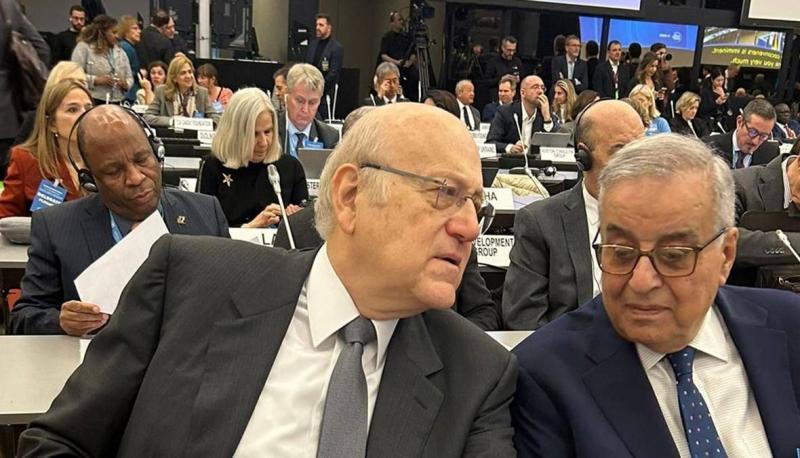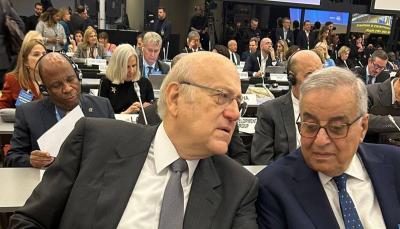The caretaker Prime Minister Najib Mikati, in a speech at the Global Refugee Conference, pointed out that "we are witnessing the ongoing humanitarian crisis faced by the Palestinian people in Gaza, and the threat of their displacement, which puts us in front of a double challenge of practically addressing the issue of Syrian displacement that has been ongoing since 2011, and examining the newly emerging file related to the situation in Gaza." Mikati stated, "It is our duty to work to stop the killing and systematic destruction occurring there, which history has never seen its like. Here, I extend my greetings to the 153 countries that supported yesterday's resolution from the United Nations General Assembly concerning the protection of civilians and the cessation of military operations in Gaza. While we reiterate our firm support for the Palestinian people and their right to self-determination, we call on the international community to take immediate action to stop the violence, ensure the protection of civilians, and work towards a just and lasting solution that respects the rights and aspirations of the Palestinian people and guarantees the right of return for Palestinian refugees, in accordance with international law."
He continued: "Lebanon, which has hosted thousands of Palestinian brothers since the beginning of their displacement ordeal 75 years ago, has paid a heavy price in defense of the Palestinian cause and shares with Palestinian brothers the limited resources available to it, calls for prioritizing efforts to resolve this conflict as it is the key to solving all the region's crises. The continued conflict, without resolution, is likely to plunge the region into successive crises that cannot be predicted in terms of their results and repercussions." Mikati reiterated the demand to "stop the ongoing Israeli aggression against Lebanon, which has led to the fall of hundreds of martyrs and wounded individuals, and to direct and indirect losses that have negative repercussions on the economy, which is already burdened with enormous debts, including the pressure of millions of displaced Syrians and Palestinian refugees, exceeding the capacity of any country to endure."
He added, "Thirteen years have passed since the beginning of the Syrian crisis and the direct repercussions it has had on Lebanon, the most notable of which is the presence of over one and a half million Syrian displaced persons in our territory and a huge increase in birth rates. The challenges we face due to this displacement go beyond economic and social dimensions to also affect community security and the sensitive demographic structure, with the number of Syrian births surpassing Lebanese births and an increase in crime rates and overcrowding in prisons, exceeding the Lebanese authorities' capacities. Competition for limited job opportunities has also increased tensions and security incidents."
Mikati expressed that "what occupies our minds is the new influx of Syrian displacement through illegal pathways for predominantly economic reasons. It is concerning that the majority of the new displaced individuals are from the youth demographic, while the army and security forces are commendably working to prevent unjustified migration flows that threaten our national independence and create sharp imbalance, intentionally or unintentionally disrupting the Lebanese structure."
He added, "This is not the first time we present this reality before you; for years we have warned of the negative repercussions of this displacement, not only on Lebanon but on all countries, especially European ones, witnessing waves of illegal immigration to European countries, despite the measures taken. These waves will undoubtedly increase and will constitute ticking time bombs in Europe if their root causes are not addressed."
Mikati said, "Lebanese people may disagree on many issues, but they are united in a single voice demanding the international community to resolve the issue of displaced persons and not to pressure Lebanon to keep them on its soil. The annual report prepared by the World Bank, which will be released in a few days, shows that the cost of Syrian displacement on Lebanon since the start of the Syrian war is estimated in tens of billions of dollars. Is it acceptable for the world to remain a spectator to a country burdened with obligations imposed upon it, with no ability to endure them? We all must share with the international community in search of a sustainable solution to this challenge."
He noted that "the Lebanese refuse to let this wound bleed at their sides, and they have the right to take measures they deem appropriate to protect their homeland and themselves. These steps begin with the return of Syrian displaced persons to their homeland and stopping international organizations from enticing them to stay in our country. International attention should focus on the displaced persons towards facilitating their return to stable areas in Syria, alongside providing assistance in their homeland. Concurrently, we need to work on a comprehensive plan that addresses the root causes of the Syrian crisis and guarantees the safe and voluntary return of refugees to their homeland. This plan should also prioritize supporting and reintegrating Syrian refugees within Syria."
He continued: "In this context, as the new migration witnessed in Lebanon is economically driven, adding new burdens on Lebanon, we propose adopting a scientific classification that distinguishes between Syrian workers and displaced persons as refugees, and establishing a national mechanism to determine the legal status of each Syrian displaced person in Lebanon, obligating private sector employers to adhere to employment conditions for Syrian workers in ways that reduce competition with Lebanese competencies. We also propose defining categories of displaced Syrians for whom return can be facilitated and setting a timeline for their return, with the guarantee of legal, security, economic, and social assurances."
Mikati pointed out that "these steps stem from the national vision of the government and most Lebanese political forces, in addition to the demands based on the interests of both the Lebanese and Syrian peoples, and the United Nations Universal Declaration of Human Rights that we are committed to respecting. Here, we must salute and appreciate the significant efforts being made by the United Nations High Commissioner for Refugees Mr. Filippo Grandi, to whom we extend our warmest greetings and utmost respect."
He emphasized that "Lebanon can no longer bear this burden alone, and everyone must share responsibility regarding this file, as they were originally partners in the responsibility that led to this dire situation. All talk about humanitarian considerations and human rights to evade accountability and place it entirely on the Lebanese shoulders has become tiresome. The question we have the right to openly ask is, do you blame us for demanding the return of a people to their land so they can live with dignity, while turning a blind eye to an explicit crime aimed at uprooting a people from their land, killing them, and displacing them? Where are the balanced humanitarian standards in the international community's dealings with these two issues?"
He concluded: "I have one last word to address to you. It is our fate to share with you the challenge of addressing displacement, and my plea to you is to prioritize this matter, as we are on the brink of total collapse, and we will not remain idle, receiving successive crises while some consider us alternative homeland projects. Rather, we will save our homeland and fortify ourselves because we have the right, first and foremost, to live in our homeland with dignity and honor. Thank you."




